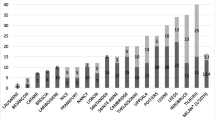Abstract
Objective
To assess the feasibility of awake surgery for a brain tumor in a population of non-French-speaking migrants in Paris, France.
Methods
The Lariboisière database of awake surgeries was retrospectively reviewed, from the first case in 2011 up to July 2018. Inclusion criteria were patients being migrated in France during their adulthood, patients being unable to speak neither French nor English. Clinical and radiological data were collected from the electronic medical charts.
Results
Five patients fulfilled inclusion criteria. Pathological diagnosis included three glioma, one meningioma, and one melanoma metastasis. The standard awake protocol of our center was followed as usual, with the additional involvement of an interpreter at each step. In the five cases, the awake procedure allowed the surgeon to tailor the resection according to functional boundaries. Resections were complete in three cases and subtotal in two cases. No neurological deficits were observed. All patients returned to their preoperative socio-professional status.
Conclusions
Awake surgery for a brain tumor can be offered to migrants, in spite of the poor verbal communication between the patient and the caring staff. A team dedicated to awake surgery and including an interpreter is the key to successfully overcome the language barrier, before, during, and after the surgery.


Similar content being viewed by others
References
Beez T, Boge K, Wager M et al (2013) Tolerance of awake surgery for glioma: a prospective European Low Grade Glioma Network multicenter study. Acta Neurochir. https://doi.org/10.1007/s00701-013-1759-0
Berger MS, Deliganis AV, Dobbins J, Keles GE (1994) The effect of extent of resection on recurrence in patients with low grade cerebral hemisphere gliomas. Cancer 74(6):1784–1791
Boetto J, Bertram L, Moulinié G, Herbet G, Moritz-Gasser S, Duffau H (2015) Low rate of intraoperative seizures during awake craniotomy in a prospective cohort with 374 supratentorial brain lesions: electrocorticography is not mandatory. World Neurosurg. https://doi.org/10.1016/j.wneu.2015.07.075
Brisset C, Leanza Y, Laforest K (2013) Working with interpreters in health care: A systematic review and meta-ethnography of qualitative studies. Patient Educ Couns 91(2):131–140
De Luca R, Aragona B, Leonardi S, Torrisi M, Galletti B, Galletti F, Accorinti M, Bramanti P, De Cola MC, Calabrò RS (2018) Computerized training in poststroke aphasia: what about the long-term effects? A randomized clinical trial. J Stroke Cerebrovasc Dis 27(8):2271–2276
De Witt Hamer PC, Robles SG, Zwinderman AH, Duffau H, Berger MS (2012) Impact of intraoperative stimulation brain mapping on glioma surgery outcome: a meta-analysis. J Clin Oncol 30(20):2559–2565
Farghaly WM, Ahmed MA, El-Tallawy HN, Elmestikawy TA, Badry R, Farghaly MS, Omar MS, Hussein ASR, Salamah M, Mohammed AT (2018) Construction of an Arabic computerized battery for cognitive rehabilitation of children with specific learning disabilities. Neuropsychiatr Dis Treat 14:2123–2131
Fernández Coello A, Moritz-Gasser S, Martino J, Martinoni M, Matsuda R, Duffau H (2013) Selection of intraoperative tasks for awake mapping based on relationships between tumor location and functional networks. J Neurosurg 119(6):1380–1394
Hervey-Jumper SL, Li J, Lau D, Molinaro AM, Perry DW, Meng L, Berger MS (2015) Awake craniotomy to maximize glioma resection: methods and technical nuances over a 27-year period. J Neurosurg 123(2):325–339
Kelm A, Sollmann N, Ille S, Meyer B, Ringel F, Krieg SM (2017) Resection of gliomas with and without neuropsychological support during awake craniotomy-effects on surgery and clinical outcome. Front Oncol 7:176
Malécot V, Costil M, Fattori F (2018) Le Monde. https://lemonde.fr/europe/article/2018/06/28/migrations-vers-l-europe-les-chiffres-et-les-routes_5322410_3214.html? Accessed 17 Sept 2019
Mandonnet E, De Witt HP, Poisson I et al (2015) Initial experience using awake surgery for glioma: oncological, functional, and employment outcomes in a consecutive series of 25 cases. Neurosurgery. https://doi.org/10.1227/NEU.0000000000000644
Mandonnet E, Cerliani L, Siuda-Krzywicka K, Poisson I, Zhi N, Volle E, de Schotten MT (2017) A network-level approach of cognitive flexibility impairment after surgery of a right temporo-parietal glioma. Neurochirurgie 63(4):308–313
Spena G, Schucht P, Seidel K et al (2017) Brain tumors in eloquent areas: a European multicenter survey of intraoperative mapping techniques, intraoperative seizures occurrence, and antiepileptic drug prophylaxis. Neurosurg Rev 40(2):287–298
Wolz MM (2015). Language barriers: challenges to quality healthcare - International Journal of Dermatology - Wiley Online Library. https://onlinelibrary.wiley.com/doi/full/10.1111/ijd.12663. Accessed 8 Aug 2019
Funding
No funding was received for this research.
Author information
Authors and Affiliations
Corresponding author
Ethics declarations
Conflict of interest
The authors declare that they have no conflict of interest.
Ethical approval
All procedures performed in studies involving human participants were in accordance with the ethical standards of the Lariboisière Hospital and with the 1964 Helsinki declaration and its later amendments or comparable ethical standards. For this type of retrospective study, formal consent is not required.
Patient consent
The patient has consented to the submission of the case report for submission to the journal.
Additional information
Publisher’s note
Springer Nature remains neutral with regard to jurisdictional claims in published maps and institutional affiliations.
This article is part of the Topical Collection on Tumor - Other
Electronic supplementary material
ESM 1
(XLSX 20 kb)
Rights and permissions
About this article
Cite this article
Aubrun, S., Poisson, I., Barberis, M. et al. The challenge of overcoming the language barrier for brain tumor awake surgery in migrants: a feasibility study in five patient cases. Acta Neurochir 162, 389–395 (2020). https://doi.org/10.1007/s00701-019-04101-1
Received:
Accepted:
Published:
Issue Date:
DOI: https://doi.org/10.1007/s00701-019-04101-1




